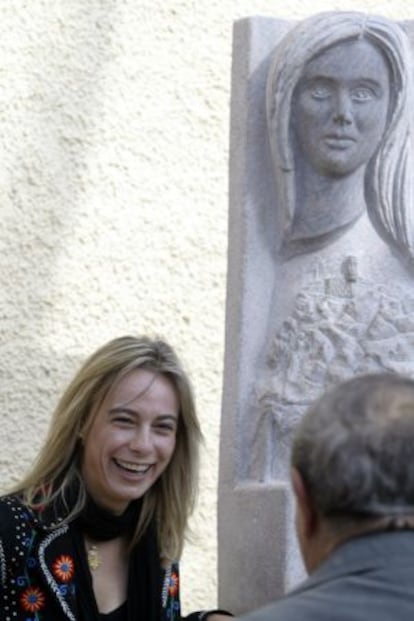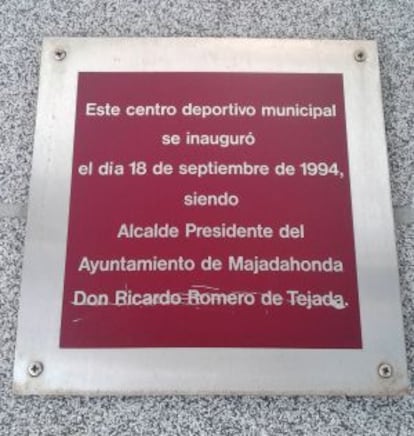Monuments to the disgraced
Calls have been growing to remove statues referring to politicians implicated in scandals

“A valiant woman you were born, you behaved correctly, fighting for Alicante, and stood out among all,” reads the inscription under a less-than-lifelike bas-relief stone carving of Sonia Castedo in the village of Verdegás, in Alicante. The former Popular Party mayor of the province’s capital city faces five separate charges in two investigations into rezoning irregularities. After holding on for six years, she finally gave into party pressure just before Christmas, announcing her decision to stand down from her post on her Facebook account. Castedo is accused of having favored local businessman Enrique Ortiz, who is implicated in the Brugal and Gürtel corruption networks, in the awarding of building contracts.
The sculpture was commissioned by Verdegás mayor Vicente García, a friend of Castedo and the husband of Julia Castelló, Castedo’s child-minder and advisor. It is just one of many scattered throughout Spain that provide an embarrassing reminder of dozens of politicians now implicated in corruption scandals and wrongdoing.
Over the last couple of years there has been growing pressure to remove statues and plaques and change street names that refer to public figures who now face disgrace. For the moment, most of the people involved have not yet been tried, as is the case with Castedo. But in many cases, local councils and city halls have already gone ahead and removed them. For example, the Madrid dormitory town of Valdemoro has just approved the name change of Francisco Granados street. Granados is a former mayor and member of the Madrid regional government now under investigation for corruption. Across the other side of the capital, in the wealthy community of Boadilla del Monte, the local council has decided not to replace a plaque commemorating the opening of a concert hall by former mayor Arturo González Panero that had been taken down during recent repainting work.
Upcoming legislation in the Valencia region will allow for the removal of monuments to public officials found guilty of wrongdoing there
Mateo Solana, a 58-year-old resident of Majadahonda, 16 kilometers northwest of Madrid, says he’s not particularly bothered about the two plaques there featuring the names of former mayors Ricardo Romero de Tejada and Guillermo Ortega, admitting he doesn’t even know where they are. Socialist Party members on the town council recently put forward a motion calling for the plaques, which are located on the town’s main pedestrian shopping thoroughfare, to be removed and the two men, who are implicated in the Bankia and Gürtel cases, to be declared personae non gratae. But the majority Popular Party has refused, arguing that the men have not yet been convicted. “You could see this coming,” says Solana, who has lived in Majadahonda for 30 years and says he knew the two former mayors personally.
Upcoming transparency legislation approved by the regional government of Valencia will allow for the removal of plaques and other monuments to public officials found guilty of wrongdoing there. The United Left coalition is calling for such removal to be mandatory, starting with a plaque mentioning Pedro Ángel Hernández Mateo, the former PP mayor of the Alicante resort town of Torrevieja, who began a three-year jail term in July for forgery and breach of trust.

At least 30 mayors, most of them belonging to the PP and Socialist Party, have been sent to jail over the last decade throughout Spain. Many have been in office for more than a decade, giving some idea of the number of plaques there might be out there.
The main square in Os Blancos is named after José Luis Baltar, the head of the provincial government of Ourense, where the small community is located. Baltar was head of Ourense’s provincial administration for 23 years, and in July of 2014, was banned from holding public office for nine years after being found guilty of favoritism and overstepping his authority. His name is to be found throughout the province on street names, swimming pools, and leisure centers, and even a bridge. The Socialist Party managed to have a bust of him removed from a square in Os Blancos, but another remains in place in the town.
Visitors to Castellón’s barely operative airport cannot fail to notice a 24-meter-high sculpture at the entrance created by local artist Juan Ripollés “inspired” by the longstanding former head of the provincial government of Castellón, Carlos Fabra. Commisioned at an estimated cost of €300,000, the sculpture prompted Fabra to say: “I am delighted to know that I inspire artists. It’s marvelous.” The disgraced politician began an eight-year jail term in December 2014, and in the period leading up to his trial, at least three plaques honoring his achievements during his two decades in office were removed from the town of Benlloch, along with another mentioning Rafael Blasco, a former member of the Valencian regional parliament sent down for eight years in June of 2014 for fraud.
Socialist Party councilors in the Costa del Sol resort of Fuengirola, as well as in El Ejido, a sprawling agricultural center in Almería, have called for the removal of plaques placed by Jaume Matas, a former PP minister and head of the regional government of the Balearics, who was recently sentenced to nine months in jail for corruption. Numerous plaques bearing his name have since been removed from towns on the island of Mallorca.
Tu suscripción se está usando en otro dispositivo
¿Quieres añadir otro usuario a tu suscripción?
Si continúas leyendo en este dispositivo, no se podrá leer en el otro.
FlechaTu suscripción se está usando en otro dispositivo y solo puedes acceder a EL PAÍS desde un dispositivo a la vez.
Si quieres compartir tu cuenta, cambia tu suscripción a la modalidad Premium, así podrás añadir otro usuario. Cada uno accederá con su propia cuenta de email, lo que os permitirá personalizar vuestra experiencia en EL PAÍS.
¿Tienes una suscripción de empresa? Accede aquí para contratar más cuentas.
En el caso de no saber quién está usando tu cuenta, te recomendamos cambiar tu contraseña aquí.
Si decides continuar compartiendo tu cuenta, este mensaje se mostrará en tu dispositivo y en el de la otra persona que está usando tu cuenta de forma indefinida, afectando a tu experiencia de lectura. Puedes consultar aquí los términos y condiciones de la suscripción digital.








































